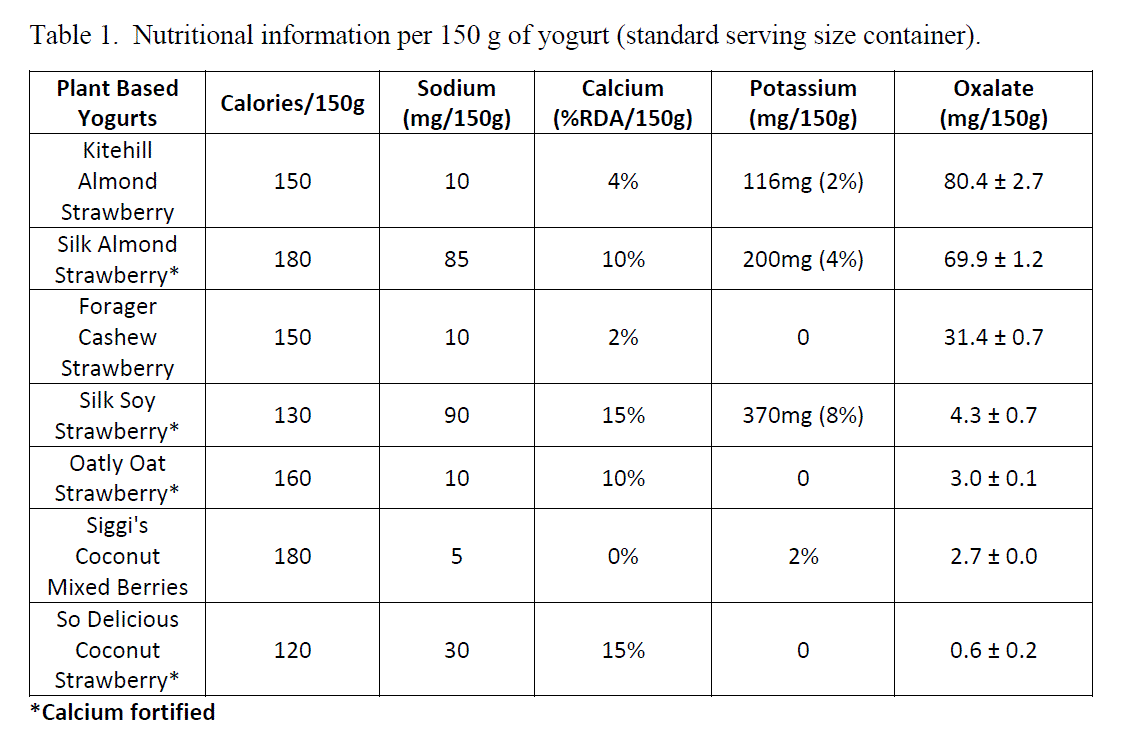Back
Poster, Podium & Video Sessions
Podium
PD05: Stone Disease: Medical & Dietary Therapy
PD05-12: What is the Best Plant-Based Yogurt for Patients with Kidney Stones and/or Chronic Kidney Disease?
Friday, May 13, 2022
11:20 AM – 11:30 AM
Location: Room 252
James Borin*, New York, NY, John Knight, Ross Holmes, Birmingham, AL, Shivam Joshi, David Goldfarb, Wilson Lin, Stacy Loeb, New York, NY

James Frederic Borin, MD
NYU School of Medicine
Podium Presenter(s)
Introduction: Patients with kidney stones are counseled to eat a diet low in animal protein, sodium and oxalate, with a modest amount of calcium, usually from dairy. However, approximately 2/3 of the global population is lactose intolerant, and plant-based diets are becoming increasingly popular due to health and environmental benefits. Restriction of sodium, potassium and oxalate may also be recommended in patients with chronic kidney disease (CKD). We previously reported a comparison of oxalate and other nutrients that are important for kidney stones and CKD in plant-based milks. The objective of this study was to compare the nutritional composition between popular brands of plant-based yogurt.
Methods: Oxalate content of commercially available plant-based yogurts was measured by ion chromatography coupled with mass spectrometry. We obtained calories, sodium, calcium and potassium content from nutrition labels.
Results: Nutritional information per 150 g serving size is shown in the table. Calcium content is highest in fortified soy, oat, almond and coconut yogurts (10-15% recommended dietary allowance (RDA)). Similar to our prior findings in plant-based milk substitutes, almond milk yogurts have the highest oxalate concentration whereas oxalate is lowest in the coconut and oat-based products. Caloric content was modest, ranging from 120-180 calories and the majority of products had low sodium content, 5-30 mg.
Conclusions: As consumption of plant-based dairy substitutes increases, it is important for health professionals and patients with renal conditions to be aware of their nutritional composition. Plant based yogurts that are fortified with calcium can provide a valuable non-dairy source of calcium. However, some nut-based yogurts (e.g., almond and cashew) have a higher oxalate content which may be problematic for patients with kidney stones or CKD. Calcium-fortified soy, oat and coconut-based yogurts have a favorable nutritional composition for patients with kidney conditions. Future studies are warranted to examine the effect of plant-based yogurts on urine chemistry.
Source of Funding: National Institute of Health (grant numbers P20DK119788, 2R01DK087967).

Methods: Oxalate content of commercially available plant-based yogurts was measured by ion chromatography coupled with mass spectrometry. We obtained calories, sodium, calcium and potassium content from nutrition labels.
Results: Nutritional information per 150 g serving size is shown in the table. Calcium content is highest in fortified soy, oat, almond and coconut yogurts (10-15% recommended dietary allowance (RDA)). Similar to our prior findings in plant-based milk substitutes, almond milk yogurts have the highest oxalate concentration whereas oxalate is lowest in the coconut and oat-based products. Caloric content was modest, ranging from 120-180 calories and the majority of products had low sodium content, 5-30 mg.
Conclusions: As consumption of plant-based dairy substitutes increases, it is important for health professionals and patients with renal conditions to be aware of their nutritional composition. Plant based yogurts that are fortified with calcium can provide a valuable non-dairy source of calcium. However, some nut-based yogurts (e.g., almond and cashew) have a higher oxalate content which may be problematic for patients with kidney stones or CKD. Calcium-fortified soy, oat and coconut-based yogurts have a favorable nutritional composition for patients with kidney conditions. Future studies are warranted to examine the effect of plant-based yogurts on urine chemistry.
Source of Funding: National Institute of Health (grant numbers P20DK119788, 2R01DK087967).

.jpg)
.jpg)